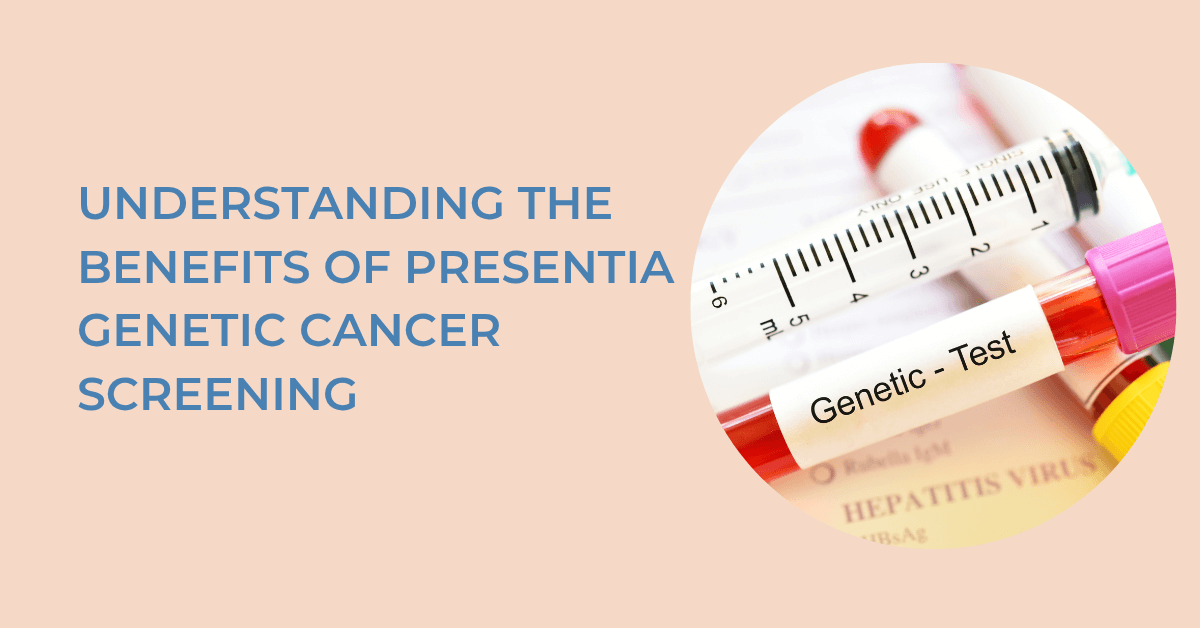Cancer often strikes without warning, leaving individuals and families feeling powerless. But what if you could read the warning signals written in your DNA—before cancer develops? This is the promise behind PreSENTIA Genetic Cancer Screening. With this advanced genetic test, you can uncover your inherited risk for cancer and take proactive steps to protect your health.
This article explains how PreSENTIA works, who should consider it, and why it’s poised to become a cornerstone of preventive medicine.
What Is PreSENTIA Genetic Cancer Screening?
PreSENTIA is an advanced genetic test designed to identify inherited risks for various cancers. Unlike standard cancer screenings that look for existing disease, PreSENTIA analyzes your DNA to detect mutations in over 30 clinically relevant genes associated with hereditary cancers. These include well-known genes such as BRCA1, BRCA2, TP53, MLH1, MSH2, and APC.
How does it work?
- Sample Collection: A simple saliva or blood sample is all that’s needed.
- Gene Analysis: Using next-generation sequencing, the test examines your DNA for mutations linked to increased cancer risk.
- Expert Guidance: Results are explained by genetic counselors and healthcare providers, helping you understand your risk and next steps.
Who should consider PreSENTIA?
- Individuals with a personal or family history of cancer
- Those with a known hereditary cancer syndrome
- Anyone concerned about their inherited genetic risk
Key Benefits of PreSENTIA Genetic Cancer Screening
1. Personalized Risk Assessment
Traditional cancer risk models rely on general factors like age, gender, and family history. PreSENTIA goes further by analyzing your unique genetic makeup. By examining over 30 genes, it provides a tailored risk profile for specific cancers, offering insights that are more accurate and relevant than standard screening tools.
2. Enables Early Detection
Early detection is critical:
- The 5-year survival rate for early-stage breast cancer is over 90%.
- For late-stage breast cancer, survival drops to 30% or less.
By identifying high-risk individuals, PreSENTIA enables healthcare providers to recommend earlier and more frequent screenings, increasing the chances of catching cancer at its most treatable stage.
3. Informs Preventive and Medical Decisions
Knowing your genetic risk empowers you and your doctor to make informed choices, such as:
- Preventive surgeries (e.g., mastectomy, oophorectomy)
- Risk-reducing medications
- Customized screening schedules (e.g., earlier or more frequent colonoscopies, mammograms, MRIs)
- Lifestyle modifications (diet, exercise, smoking cessation)
This proactive approach helps you stay ahead of cancer, rather than reacting after a diagnosis.
4. Protects Your Family
Genetic mutations can be inherited. If you test positive for a mutation, your relatives may also be at risk. PreSENTIA results can guide family members to:
- Undergo their own genetic testing
- Start early surveillance and preventive care
- Increase family-wide awareness and preparedness
5. Supports Reproductive Planning
For those with a strong family history of cancer, genetic insights are invaluable when planning a family. PreSENTIA can inform:
- Fertility preservation options (if preventive treatments may affect fertility)
- Preimplantation genetic diagnosis (PGD) to avoid passing on high-risk mutations
- Timing of preventive measures to align with family planning goals
6. Accessible, Accurate, and Actionable
PreSENTIA is meticulously designed to prioritize both clinical reliability and patient convenience, catering to the needs of individuals seeking clarity about their genetic health.
– Simple Sample Collection: The process allows for easy sample submission, whether through saliva or blood, making it accessible for patients without the need for complex procedures.
– High Accuracy: Utilizing advanced next-generation sequencing technology, PreSENTIA ensures precise analysis of genetic material, significantly increasing the likelihood of accurate results regarding potential genetic mutations.
– Comprehensive Support: Alongside the testing, PreSENTIA offers in-depth genetic counseling. This service is crucial in helping patients understand their results, providing insights into their implications, and assisting in planning personalized next steps based on the findings.
Many individuals find the uncertainty of not knowing their genetic status to be the most distressing aspect of their health journey. PreSENTIA aims to alleviate this anxiety by offering peace of mind. Whether the testing reveals a mutation or not, you will receive critical information that empowers you to make informed decisions about your health and future. With the insights gained from PreSENTIA, you can move forward with confidence, equipped to plan for what lies ahead.
Final Thoughts
If you have a personal or family history of cancer, or if you’re interested in taking a proactive approach to your overall health, it may be beneficial to consult with your doctor or a genetic counsellor about PreSENTIA Genetic Cancer Screening. This advanced testing can provide valuable information about your genetic predisposition to certain types of cancer.
Understanding your risk factors is crucial; it empowers you to make informed decisions regarding your health and wellness. By identifying potential risks early on, you can implement preventative measures that may significantly reduce your chances of developing cancer. This proactive strategy can include lifestyle changes, more frequent screenings, or even considering preventive surgeries.
Additionally, being aware of your genetic risk not only protects you but also helps safeguard your loved ones, as you can share important information that may affect their health decisions as well. Don’t hesitate to reach out to a healthcare professional to discuss whether PreSENTIA Genetic Cancer Screening is right for you. Taking this step could be pivotal in altering the trajectory of your future health.
References:
- American Cancer Society: Survival Rates for Breast Cancer
- National Cancer Institute: Genetics of Cancer
Need more information or want to book a test?
Contact your healthcare provider or visit the PreSENTIA website for details.
